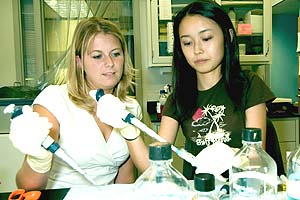Diane Ma, who will be a junior this year at Parkway South High School in St. Louis County, has always been interested in the brain and how it functions.
This summer, she participated in the 2005 Pfizer-Solutia Partnership of Universities’ Students and Teachers as Research Scientists (STARS) program for gifted high-school students.

In the program, Ma delved into the inner workings of brain tumors, which are common in children who have a genetic disorder called neurofibromatosis type 1 (NF1). She conducted research in the laboratory of David H. Gutmann, M.D., Ph.D., the Donald O. Schnuck Professor of Neurology and director of the University’s Neurofibromatosis Center.
The majority of brain tumors in humans are caused by an abnormal proliferation of cells called astrocytes. Working with Danielle Scheidenhelm, an M.D.-Ph.D. student, Ma analyzed the cytoskeleton of astrocytes engineered to lack Nf1 gene expression. The cytoskeleton gives the cell its shape and is important for a variety of properties of tumor cells, including how fast the cells divide and how they move.
Ma learned that when Nf1-deficient astrocytes were maintained under conditions that were not permissive for cell growth, the cytoskeleton resembled that of normal cells that were treated with growth-promoting factors. These results suggest that astrocytes in individuals with NF1 may continue to proliferate, even when conditions are unfavorable for cell growth.
“These findings have implications for how tumor cells grow,” Ma said. “If we can determine the regulation of the cytoskeleton, we could possibly develop better drugs or develop an application for a current drug.”
Ma was one of 54 academically talented high-school juniors and seniors who participated in the STARS program, which pairs students with research mentors from WUSTL, the University of Missouri-St. Louis and Saint Louis University.
Forty-eight students from area high schools in the St. Louis metropolitan area and six students from out of town participated in the program.
For six weeks, medical researchers, biologists, chemists, computer scientists, earth scientists, engineers and other scientists shared their expertise as they directed the students in research projects in their labs.
“This program is unique because students are introduced to hands-on opportunities to address real-world problems, exposing them to basic research, creativity and the struggles of discovery,” said Ken Mares, director of the STARS program.
Besides conducting research and presenting papers, students attended lectures by leading scientists (including one about the physics of parachutes), toured scientific enterprises in St. Louis and took part in career workshops. They also cheered on the Cardinals during the last season in the current Busch Stadium.
“This experience has made me more interested in science and helped me realize that I want to go into clinical medicine,” said Ma, who also plays violin in her school orchestra and is involved in a number of other organizations.
Her research paper was reviewed by Pfizer Inc. and was given the Pfizer Award for Excellence in Research.
Scheidenhelm said Ma took initiative and conducted her experiments very carefully.
“I think her attention to detail and work ethic will benefit her in a scientific career,” Scheidenhelm said. “I think she can achieve anything she wants.”
Scheidenhelm especially enjoyed being a mentor in the STARS program because she participated in a similar program in high school.
“I liked being on the other side and mentoring a student,” she said. “My experience in high school really helped me form my education and career goals.”
Ma would like to attend an Ivy League school and hopes to become a family practitioner.
“This program has made me much more motivated,” she said. “I also think I did something very worthwhile this summer.”